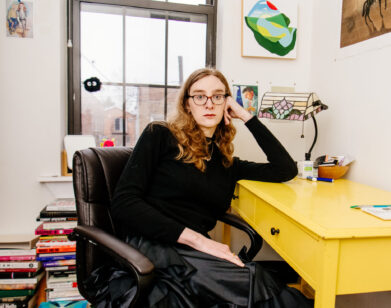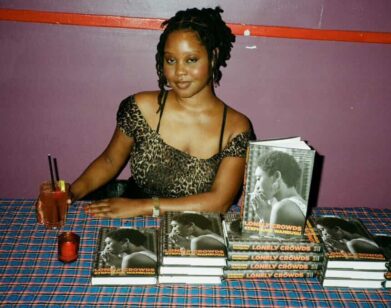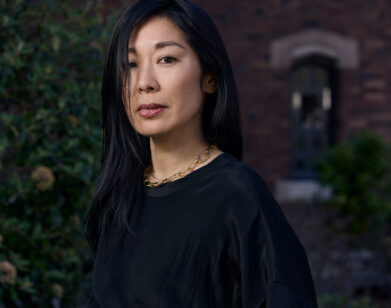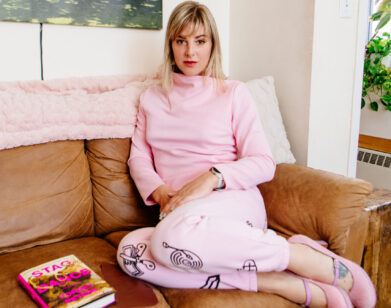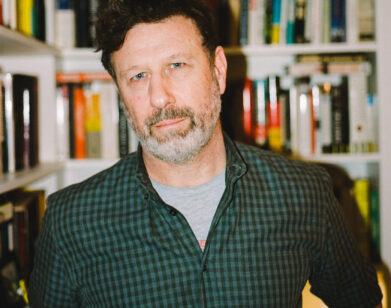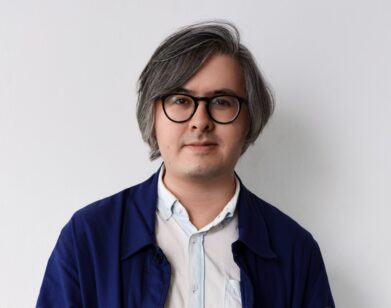LIT
Gabriel Bump and Ed Park Compare Notes on Their New Novels
Gabriel Bump’s sophomore novel The New Naturals is a book about a utopia that doesn’t fully deal with utopia: mourning the loss of her newborn child, Rio, a young Black woman living in Western Massachusetts comes across an abandoned restaurant just off the highway. She becomes fixated on the idea of a safe haven, an equitable world that would grant anyone love, acceptance and opportunity and an honest education in history. After convincing her husband to aid her in constructing an underground society (and securing a sympathetic benefactor), she sets out to execute her vision. “It’s no surprise that this utopia doesn’t work out,” Bump joked over Zoom with fellow novelist Ed Park, who’s just completed his own sophomore novel, Same Bed Different Dreams, his first book in fifteen years. “Once this utopia came into existence, I knew it was going to fail, and then it was fun.” In his novel, Park imagines an alternative history in which the Korean Provisional Government [KPG] still exists and is working toward a unified nation by mysterious means. Shortly after both their books were released, the writers found numerous overlaps in their personal lives and careers, one being the city of Buffalo. After a period of emotional and professional turmoil, Bump eventually rented a room in a Buffalo, where Park was born and raised, to settle down and complete his novel. A few weeks ago, the two talked about the Sabres and the start-and-stop processes by which their novels came to be.—EMILY SANDSTROM
———
ED PARK: Good to finally see you in something like real life, Gabe.
GABRIEL BUMP: Thanks so much for agreeing to do this.
PARK: So actually, the reason I’m slightly late is that I just finished it.
BUMP: [Laughs] Oh, really?
PARK: One of the great things about it is, I didn’t know what to expect. At every turn, new characters come up, but as I moved onto the last 30 pages or so I kept being surprised. That last short chapter left me gasping. I really take my hat off to you.
BUMP: Well, thanks. The ending was always going to be the ending. It’s no surprise that this utopia doesn’t work out. Some things go wrong, and what does go wrong might be surprising. As I really got going, once this utopia came into existence, I knew it was going to fail, and then it was fun.
PARK: Right.
BUMP: I’m really curious where your book started with you. Which was the first thread that you had that was like, “I think this is going to turn into a novel”?
PARK: The first thing I wrote, which is now the second chapter, is the first long scene, the dinner party in New York. It’s an Asian literary publishing art scene type of party, for the visiting Korean author named Echo, who’s about to be translated and published in America. It had already been several years since my first novel [Personal Days] came out in 2008. I had been writing stories and I was assembling them into a collection. Then one day I was alone, taking a little break from family life, and I was writing on a typewriter, which sometimes I do just to do, especially when I don’t know what I’m doing. And this scene just came to me. It was like I was throwing a little party in my mind. I kept writing from that scene for a really long time. Then the more historical bits, which in the book are called “dreams,” came in around year five.
BUMP: At what stage of the first draft is year five?
PARK: I had written a full draft in first person, as the narrator Soon Sheen, and just kept going. There was this realization that it was kind of superficial. I had encountered a novel called Big Bang, this very unconventional historical novel by a writer named David Bowman. I read it and I was like, “This is such a great approach to historical fiction,” and it made me want to do something like that with parts of Korean and American history. Later I realized this all should be in the same book. I want to ask you a variation of that question. Which characters spoke to you first, and how did you think to introduce them? We start with Rio, and later we’re getting characters like Sojourner and Bounds, but they all seem to be coming from different places.
BUMP: Well, it was interesting to hear you talk about your process because I think that the inverse happened to me. It started out with these small moments and they just started blossoming outward. The ideas stage was bigger. It involved this, “How can I deal with this idea of utopia?” I was in Western Massachusetts at the time and I was driving, around fall of 2017. I had just sold my first book, Everywhere You Don’t Belong. There was a second book in the deal, and it was always called The New Naturals in my head. The first thing I wrote for this book was a scene with Bounce and Sojourner. I had Bounce trying to cook breakfast and he keeps messing it up. In the earlier drafts, he’s burning everything, the eggs, the toast, he’s setting off the fire alarm. They give up and just drink a beer.
PARK: I could relate to that scene. I’m not a good cook. I feel like we’re talking about utopia, and there are serious themes in this book, and tragedies, but it’s also so funny.
BUMP: That is where the book started, in those tiny failures. Then I started working backwards: Who is Sojourner, who is Bounce? And then, where? I knew they found this utopia somewhere, they just kind of stumbled upon it. Then it’s like, “Who is running this thing?” That’s how I got to Rio. Then, Elting and Buchanan, these homeless guys in Chicago, were the second to last thing to go. They’re kind of solely there for comic relief and philosophizing, just this back and forth.
PARK: It reminded me of Beckett’s Waiting for Godot, or Mercier and Camier, these two… not fools, but they do provide this kind of comic relief in the form of their dialogue and the way they address other people.
BUMP: Yeah. The final part was The Benefactor. I wanted to try to make this person sympathetic, and try to understand people’s motivations. That’s why this book does end up being surprising, because it’s a book about utopia that isn’t really about utopia.
PARK: It’s kind of perverse in that way–in a good way. Utopia as a literary theme is so hard to write about convincingly, or in a way that feels fresh.
BUMP: I am curious how you latched onto this idea of the KPG [Korean Provisional Government]. Because the whole idea of political movements are inherently based around the idea of utopia: How do we create a society that we want and works for everybody?
PARK: So, in 1919 there was something called the Korean Provisional Government that was formed to tell the world about what was happening in Korea, how Japan had colonized it. In reality, they didn’t really have much power, it was sort of conceptual. They had a headquarters outside of Korea in Shanghai, but the president, Syngman Rhee, was living in the U.S. already. It was this notion that they wanted to reclaim Korea. I remember reading that in a history book and I just filled it away for almost 25 years. For the book’s purposes, I allowed myself to dream a little bit in terms of, “What if the KPG was still around? Is utopia, for me or for other Korean diaspora people, a unified Korean peninsula?”
BUMP: In your book we come back to the Buffalo Sabres a lot. Why were you in Buffalo, what was going on there?
PARK: I grew up playing and watching hockey and filled myself with Sabres lore. You spent a little time in Buffalo, so you know how dearly people think of their teams, but also how heartbreaking it can be. When the Sabres were eliminated from the Stanley Cup Finals in ’99, everybody was saying, “It’s no goal.” Brett Hull’s goal didn’t count, because his foot was in the crease, and that was against the rules. Back around ’99, maybe immediately after, I wrote this sentence like, “What else could be unresolved?” I had that sentence hanging out in my head for 14, 15, 16 years. Then, as I was writing this book about Korea, I was like, “What happens if we put that sentence in?” The next book will be more about the Bulls, I think.
BUMP: Since my first book was a real Chicago novel, there’s this one scene, and there’s no other reason for it to be in the story besides that I love the Bulls, where the father finds out that Michael Jordan’s coming back. He goes and sprints into Lake Michigan overcome with joy. I knew if I was going to write something, I wanted to put in that kind of moment.
PARK: Yeah, the emotional connection to sports, connection to your hometown team. Maybe by putting it into a book, you’re trying to convey some of that genuine unquenchable ardor for your hometown teams. Can we talk about why you were in Buffalo?
BUMP: This book was mainly written in Buffalo. Maybe there’s a few things going on here. One is that this book can read kind of sad, because I was in this dark moment in my life. I wasn’t doing well, I was feeling alone. I sold my books and it was this thing that I had worked for most of my adult life towards, and it didn’t fix any of my problems.
PARK: I hear you.
BUMP: One day I was in Western Mass driving west on 90, and Buffalo is about maybe seven-and-a-half, eight hours away from Amherst. I stopped there at some Marriott, not even in the city. I stayed there for a couple of days to get my bearings and then went to Chicago. I was sleeping on my friend’s couches and staying at home. I was like, “I don’t feel like being here, I don’t feel like being home, I don’t feel like going out,” because all my friends and family are there. I didn’t want to explain how I was feeling to people that I knew, if that makes sense.
PARK: It totally makes sense.
BUMP: I was like, “Where else can I go?” I had some cash for my advance, and I remembered that I really liked those two days I spent in Buffalo. So I moved there, and in this really sad state I rented an apartment above a coffee shop in a new multipurpose building on Elmwood. I would wake up in the morning and go running and then I would go to this coffee shop to work on this book. I thought this would be the last thing I’d do with my life, it was at that stage. I’m sure people have felt this, especially artists, where you’re like, “Life doesn’t seem to be working, but I know I like writing. So let me finish this book that I have to do.” As I was writing, life started feeling better. I feel like it shows in the book; people start feeling better, even though nothing is fixed. My book doesn’t really have this sweet, happy ending, but we kind of know where everybody is at the end.
PARK: It’s almost like the book was working on you, right?
BUMP: Yeah.
PARK: When I was younger and wasn’t married yet, I lived on 83rd Street near Amsterdam. I was working at The Village Voice and I would sit down with a coffee and just write. Not to romanticize it too much, but there’s something really good for the soul about writing in places like that. And I’m very happy that you wrote most of The New Naturals in Buffalo.
BUMP: I think there is something to be said about Buffalo. The Buffalo sections in Same Bed Different Dreams adds this sense of real heart and emotion. Maybe because it’s so small and contained, while simultaneously being packed, filled with emotion, with sadness, maybe some frustration. When I was reading your book I was like, “I really like these sections, these characters. Is it just Ed? Is it Buffalo? Is it just me thinking about Buffalo?”
PARK: Maybe it’s a little bit of everything. Obviously I was born and raised there, but I haven’t lived there in a long time so maybe my memory is putting a glowing haze over the whole thing. There was something that I tried to bring into the book that was pulling from that experience.
BUMP: How does it feel to have your second novel out?
PARK: It feels great. It’s been so long, and I feel like a lifetime has passed by, but I think it was worth it. Over the years, part of me would get frustrated and say, “Everybody else who was writing around the same time, they have all these books out, and you’re just starting things and abandoning them.” There was a realization that the book needed to encompass all of these things. Once I realized it should be on that scale, I was able to figure out how to write it.
BUMP: It sounded like in the early attempts to get this book going, you said you were writing through threads that weren’t really working. We’re all really grateful that you didn’t abandon this, but why didn’t you?
PARK: I think it’s partly ego, that I didn’t want to confess to myself and others that I threw away three, four, however many years doing this thing that didn’t work. I wanted to mention Bounce and Aviere, because when they’re first talking it gave me so much pleasure. I felt like you were so accurate in depicting what it’s like talking to a child. I could have read this dialogue for 30 pages. Your book encompasses so many emotions. And partly, it’s the humor that hooked me and kept me in it.
BUMP: Thank you. I feel the same about your book. I think because the characters are in different emotional stages, they’re interacting with the world in different ways. One of the really fun things about writing a wrenching book is showing how these people are operating in the world. Through those tiny interactions you can really see them improve and come to some better understanding of self and of the world. I don’t think I’ll ever write a book with this many characters again. It’s going to be in the first-person from here on out.
PARK: Me too. We’ve got a deal.


